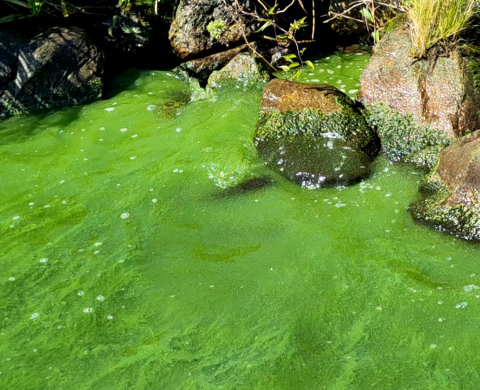Climate change impacts on harmful algal blooms

Details
- Department
- Aquatic Ecology
- Research group
- Van de Waal Group: Phytoplankton Ecology
- Funding
- ERC Consolidator Grant
- Horizon Europe
Freshwater harmful cyanobacterial blooms
Harmful cyanobacterial blooms produce toxins that are a major threat to water quality and human health. Blooms increase with eutrophication and are expected to be amplified by climate change. Yet, we lack a mechanistic understanding on the toxicity of blooms, and their response to the complex interplay of multiple global change factors. Bloom toxicity is determined by a combination of mechanisms acting at different ecological scales, ranging from cyanobacterial biomass accumulation in the ecosystem, to the dominance of toxic species in the community, contribution of toxic genotypes in the population, and the amounts of toxins in cells.
In this project, we will develop a fundamental understanding of bloom toxicity by revealing the combined effects of nutrients, elevated pCO2 and warming at each scale, and integrate these responses using a unique combination of ecological theory, technological advances, and methodological innovations. Specifically, we will use first principles to scale from cellular traits, like carbon and nutrient acquisition, cellular toxin synthesis and growth rates, to population and community dynamics.
Marine harmful algal blooms
Eutrophication of coastal marine waters has led to the proliferation of harmful algal blooms, and it is expected that climate change will impact the dynamics and toxicity of blooms. We currenlty know little about the combined effects of changing environmental factors on coastal marine algae, such as diatoms, dinoflagellates and haptophytes, and particularly lack understanding on the consequences and feedbacks with the plankton food-web.
In this project, we will assess the direct and indirect effects of combined environmental changes on various marine harmful algae taxa. By scaling from single species to populations and communities, we will develop a mechanistic understanding on how multiple environmental change factors impact harmful agal blooms and their interaction with the food-web.
More than knowing who is there, it is important to know what they are doing
Details
- Department
- Aquatic Ecology
- Research group
- Van de Waal Group: Phytoplankton Ecology
- Funding
- ERC Consolidator Grant
- Horizon Europe
Experts
-

-
Andrea Budiša
Postdoc , Aquatic Ecology
-
Annemieke Drost
PhD Candidate , Aquatic Ecology
-
Chaohong (Harley) Lin
PhD Candidate , Aquatic Ecology
-
Arnaud Louchart
Postdoc , Aquatic Ecology
-
Savannah Sarkis
PhD Candidate , Aquatic Ecology

